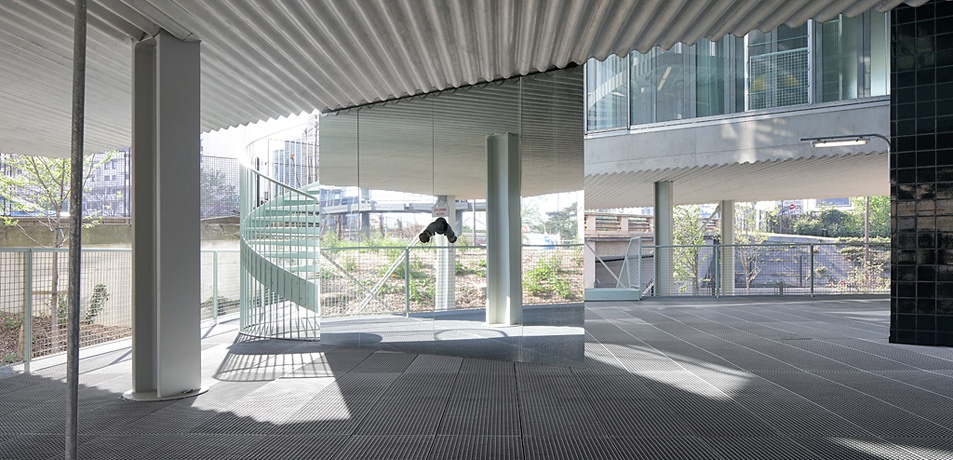Stéphanie Bru, Alexandre Theriot (Bruther): The norm and the unsettled
sto lectureACHTUNG - ABGESAGT
Aufgrund des für Donnerstag 9. Jänner 2020 angekündigten Generalstreiks in Frankreich, wird Alexandre Theriot nicht von Paris nach Innsbruck reisen können. Sein Vortrag muss damit leider erneut abgesagt werden und wird voraussichtlich im Herbst 2020 nachgeholt werden.
Stéphanie Bru und Alexandre Theriot, die seit 2007 mit ihrem in Paris ansässigen Büro Bruther tätig sind, zählen sich selbst zu jener Generation nach der Zeit der großen „Star-Architekten“, die weniger Wert auf große Gesten und Autorenschaft legt und nicht die Form, sondern den Menschen als Nutzer in den Vordergrund stellt. Ausgehend von der Überzeugung, dass sich die Anforderungen an Räume stetig verändern, versuchen sie in ihren Projekten möglichst offene Raumstrukturen zur Verfügung zu stellen, in denen sich Nutzungen weiterentwickeln können. Eine reduzierte, fast karge Formensprache und einfache Grundrisse mit offenen, flexiblen Flächen charakterisieren ihre Entwürfe, wie etwa die „Maison de l’imagination et de la recherche“ in Caen, das Kultur- und Sportzentrum Saint-Blaise in Paris, einen Wohnbau für Forscher in der CIUP oder das Projekt, mit dem sie vor kurzem den Wettbewerb für das Life-Sciences-Gebäude der EPFL Lausanne gewannen.
Der Vortrag von Stéphanie Bru und Alexandre Theriot war ursprünglich im Rahmen der Ausstellung „Legislating Architecture | Architecting after Politics“ geplant und musste kurzfristig abgesagt werden. Den Themenfeldern der damaligen Ausstellung entsprechend werden sie über ihren Umgang mit Normen und Standards sprechen.
„As architects, we are constantly confronted with the standard. Behind every line we draw, every shape we draw, there is already a materiality induced. Such thickness implies such a type of material. But this material never comes alone. Its "technical performances", which it is so proud to present, act as guarantors, so that it can be used with confidence. Sometimes it is even referred to as an "implementation suggestion", as there are "preparation suggestions" on some food products. These figures, these recipes, it was others than us who established them. It is not that we do not trust them, but if we are going to work (with) a material, we would like its discovery to be done with us alone. This is the risk to be taken to ensure that our projects are signed to the end of their materiality.
Our architecture is without pretense. In our company, everything speaks for itself. And so, our duty is sometimes to teach new words, even a new language, to certain elements that threatened to talk.
Industrial materials can discover the rhetoric of technological assemblies or the sensitivity of a relationship to light variations. By being used against nature, some elements find second nature. By contagion of uses or production methods, new potentials are emerging. This versatility of matter, its reinvention on and by itself, is undoubtedly the philosopher's stone of architectural practice. This revelation of a poetic and economic potential, beyond the "tests" carried out upstream by the manufacturers, is our competence.
The risk we take in some implementation choices is ultimately the risk that the material has allowed us to take. Norms, standards and other recommendations should not be merely a means of constraining the art of building. We are obviously sponsored by constructive rigor, but we do not want a pre-established constructive "discipline" that would dictate our procedures, and therefore our aesthetics. When we build, we establish our own "rule of the game", a term in which "game" is as important as "rule". But rather than throwing the dice, let us start by launching constructive bets, prior to any new project.“ (Bruther)
bruther
stéphanie bru geb. 1973; Architekturstudium an der École Nationale Supérieure d’Architecture Paris Belleville; u. a. 2018 – 19 Gastprofessorin an der EPFL, Lausanne
alexandre theriot geb. 1972; Architekturstudium an der École Nationale Supérieure d’Architecture Marne-la-Vallée; seit 2019 Professor an der ETH Zürich
seit 2007 gemeinsames Büro Bruther in Paris
bauten und projekte (Auswahl)
2011 – 14 Kultur- und Sportzentrum, Paris; 2013 – 15 Kultur- und Forschungszentrum, Caen; 2013 – 17 Residence for Researchers, Cité internationale de Paris; 2016 – 21 Life-Sciences-Gebäude der EPFL, Lausanne; 2017 – 21 „Frame“ Medienhaus, Brüssel; 2018 – 21 Revitalisierung der Galeries Lafayette, Pau
Ein Vortrag mit freundlicher Unterstützung von sto

